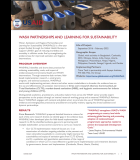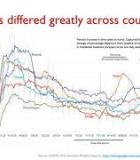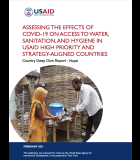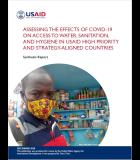Suaahara (Good Nutrition) II (Suaahara II)
The Suaahara II project in Nepal, funded by the U.S. Agency for International Development (USAID), builds on the success of the Suaahara I project. The project’s goal is to improve the nutritional status of more than 1.5 million women and children under 2 years of age. Suaahara II will cover 40 underserved rural districts of Nepal (38 districts from Suaahara I and two additional districts). As one of the consortium partners, FHI 360 has responsibility for providing technical inputs into nutrition assessment counseling and support. The consortium is led by Helen Keller International.
Suaahara I successfully reached more than 625,000 households with its integrated nutrition programming. Suaahara II also recognizes the importance of a multisectoral approach to realize its goals and the need to address equity, gender, social inclusion, behavior change and good governance. The project partners with the Nepal Ministry of Health, other government entities and other USAID-funded projects in overlapping districts.
The SUAAHARA project has been just being initiated and has been planned in 40 districts in all the development regions of Nepal. The project will be implemented under consortium approach in which ENPHO will contribute to achieve outcome on WASH “i.e., Household Adopts Essential WASH Actions”. The project will mainly support to attain ODF in the remaining district and promote total sanitation which has already gained ODF status. The project envisioned to improve nutrition status of the people particularly women and children through improving WASH status.
Activity Description
The direct beneficiaries of the project include pregnant and lactating women, and children under 2 years of age. Additionally, the project will work with:
- Adolescent girls, to improve their understanding of nutrition, hygiene and reproductive health, and with adolescent boys to influence gender and other social norms
- Female community health volunteers and frontline health workers, to promote behavior change and use of health services
- Local government authorities, to improve their capacity to promote nutrition and health behaviors
Expected Outcomes
Suaahara II:
- Improved capacity of 127,555 stakeholders and frontline workers on WASH Promotion
- 89 VDCs are declared open defecation free
- Households have improved knowledge and practice on water treatment and safe storage
- Households have improved knowledge and practice on hygiene behavior
- Increased girls friendly and child friendly facilities at schools
- Increased investment among private sector to provide biogas, bio-sand filters, rainwater harvesting and other WASH services
- Promoted total sanitation to attain healthy home and healthy community status
Actual Outcomes
Suaahara II facilitated visits by D(P)HO representatives in 113 health facilities. Suaahara II printed and distributed 33,020 sets of participant CB-IMNCI handbooks and treatment chart booklets, zinc treatment cards, FHCV flip charts and pocket handbooks to aid Suaahara II FS and CNF.
The central staff conducted Master Training of Trainers (MToT) on IMAM/NACS for 60 trainers including 26 GoN health service providers across 6 Suaahara II IMAM Districts with the aim to improve management, referral and follow-up systems for acute malnutrition cases from the community to health
facilities.
Suaahara II provided a 5- days training on group management and saving credit to 609 VMFs, 325 1000-day mothers, 70 FCHVs and 288 HFP group members who were g graudated 1000-day mothers from Suaahara II in 35 districts to enhance their capacity and institutionalize HFP groups.
Suaahara II continued to coordinate with national stakeholders such as the National Planning Commission (NPC), Ministries, donors, private actors, and NGOs to create a favorable policy environment translating into increased investments on integrated nutrition
129 local technicians received training to make improved cooking stoves (ICS). A PPP
in Rukum-East and West and Taplejung saw the promotion and installation of 3,760 ICS, a key indicator for the healthy home approach. The private company invested $42,200, the public invested
$10,568 and civil society invested $2,594 to install 3,500 ICS.






